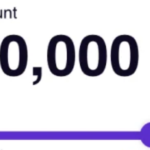
A significant personal contribution
The level of your personal contribution will allow you to benefit from real advantages in the final fixing of the credit rate. This contribution gives the banker the certainty that you are able to save well. If you know how to put money aside, the banker will not doubt your ability to repay a loan. In addition, if the bank guarantees your property, it will be well covered, the value of your house being greater than the amount of the loan. The maximum debt ratio accepted by banks is 33%. All the monthly payments of your credits must not exceed a third of your monthly income (you can calculate them on this simulator for example). In general, only high-income households can escape this 33% rule.
Long-term income
The bank will question the sustainability of your income. It will be more accommodating with an employee on an open-ended contract (CDI) than with an employee with a more fluctuating income. It is preferable to embark on a real estate project after one to two years of seniority in a company. Banks will appreciate the fact that your personal situation is stable.
Guarantees of good management
If you have difficulty managing your budget without the weight of a mortgage, it is better to promote projects other than real estate. For example, having had a PEL (Housing Savings Plan) for five years and having paid 150 euros monthly will make your approach more relevant to a banker. The PEL, in addition to the fact of bringing you more than a simple booklet A, will allow you to have preferential credit rates. But your personal financial situation is only one part of the process of crunching credit. Other elements come into play.
The quest for the right rate
Like a gold miner, you will go in search of the most interesting rate. Of course, we invite you to compare the prevailing rates and to know the state of the market in your area. To establish reliable comparisons, only the overall effective rate (TEG) should be used, since it includes all the costs of the loan (administration fees, insurance, etc.). You will also need to choose between a fixed or adjustable rate. The latter is attractive because its rate is low, especially in the early years. But it may experience increases. Your banker must provide you with all the possible scenarios. The other possibility remains to resort to a capped rate. This rate is revisable but within a specific framework. It will never exceed a ceiling fixed in advance.
Take into account insurance and administrative costs
In the majority of cases, you will have to take out borrower insurance. It covers the bank or the credit company in the event of death, disability or temporary or permanent inability to work of the borrower. You do not have to take it out from the same credit institution. The comparative difference is made on the insurance rate offered in the different offers, which is different from the credit interest rate. The administrative costs are directly included in the TEG. They rarely exceed 1.5% but nothing prevents you from claiming a small commercial flower to lighten the bill.
The right choice of guarantees
You will be asked for a guarantee, regardless of the financial amount of your loan. The most common is a mortgage: your house acts directly as collateral. If you can no longer, over time, ensure the payment of your monthly payments, the house will be seized and then sold. Mortgage fees are around 2%, according to the loan brokerage. The other solution is a registration in the privilege of the bearer of funds. It works just like a mortgage but only applies to old real estate.
The zero rate credit
No acquisition will be fully financed by a 0% loan; the latter necessarily accompanies traditional credit. The released amount, granted under conditions of resources, allows the borrower to benefit from a personal contribution which will have the effect of smoothing the amount of his rate.
Cancel your loan request
It is also possible to cancel your loan request. A simple letter is enough to cancel the procedure as long as the loan has not been contracted (this is the only condition, but it is compulsory). This greatly simplifies the procedures and allows you not to make a commitment until nothing has been signed.









